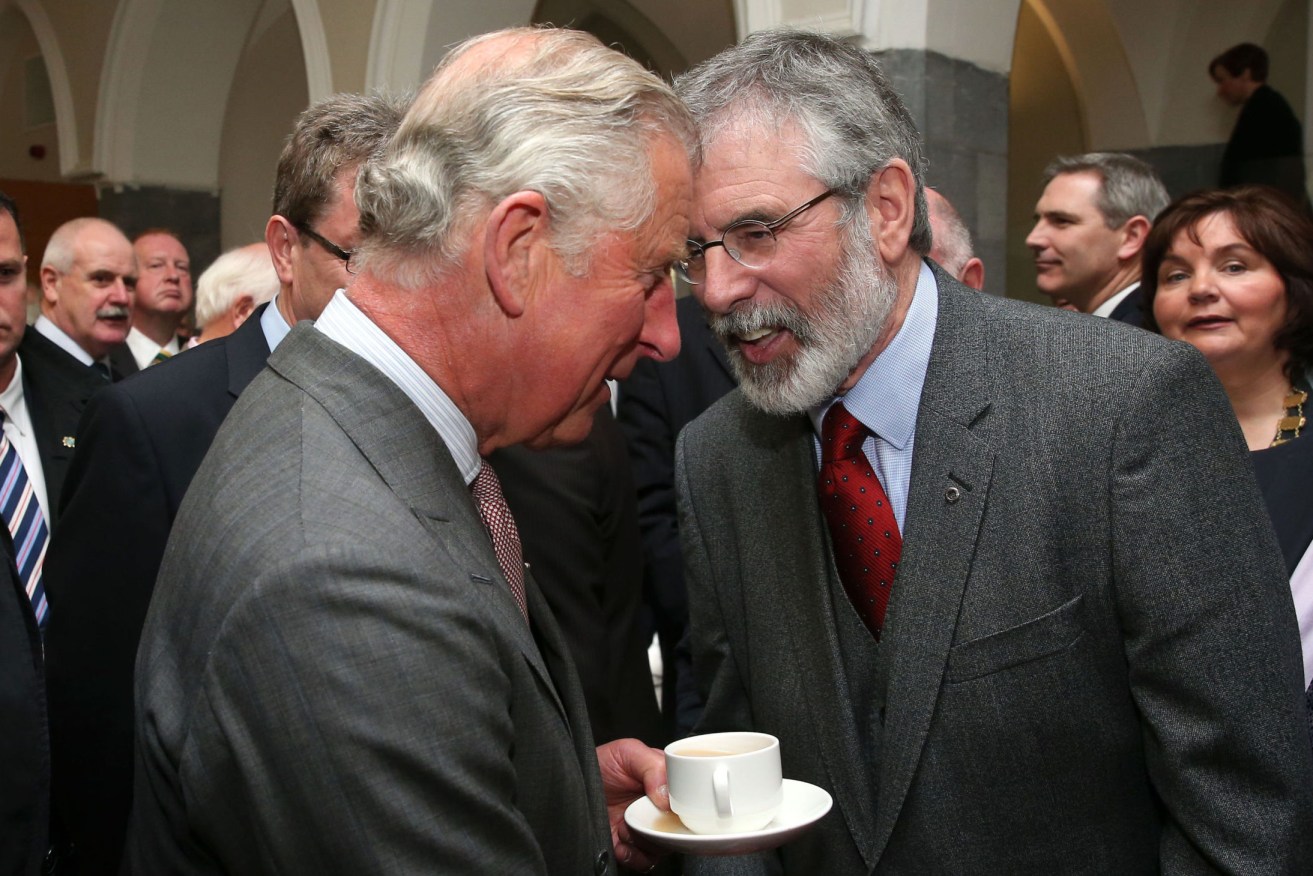Five decades later, law comes down on the side of IRA’s Gerry Adams
After 47 years, a controversial detention without trial during “The Troubles” of Northern Ireland is found to have been illegal all along, writes Lionel Hogg

Britain's Prince Charles. left, shakes hands with Sinn Fein president Gerry Adams at the National University of Ireland in Galway, Ireland, in May, 2015. (Photo: Brian Lawless/Pool photo via AP)
I met Gerry Adams in 1987. He had just spoken at the Oxford Union, in support of a motion justifying the use of violence for political ends.
The event was quite extraordinary, the first time that Adams had set foot on English soil for over a decade. His appearance was controversial and the security unprecedented in an atmosphere of considerable apprehension, Adams having been injured in an assassination attempt only a few years earlier.
The Union also faced the challenge of finding students to debate alongside Adams as well as against him, a task ultimately undertaken with relish by a young Glaswegian law student, now a judge, who was happy to argue anything.
Adams was a subject of the controversial Northern Ireland internment laws, authorising detention without trial “where it appears to the Secretary of State” that a person was suspected of being involved in terrorism.
By definition, detention without trial does not require the state to prove any wrongdoing, but Adams ultimately was convicted of related offences – twice attempting to escape lawful detention from the infamous Maze Prison – and sentenced to four and a half years’ imprisonment.
The Troubles were the product of a very different age, but only this past week the United Kingdom’s highest court ruled on a challenge by Adams to his convictions in the 1970s.
The challenge was made after secrecy restrictions on historic government documents were lifted, revealing confidential legal advice given to the Attorney General in 1974.
The advice declared that Mr Adams’ detention was likely unlawful, meaning that any prosecution for escaping lawful detention was hopelessly flawed. Despite this, the government neither released Adams from detention nor abandoned the prosecutions.
As a battlefield decision, these actions might be understandable amidst social unrest and spiralling violence.
Adams was a hugely controversial individual and was widely suspected of having led the IRA, although he always denied it. Efforts by authorities to curtail his influence continued for many years, including laws preventing the broadcasting of his (and other republican and loyalists’) voices in media until 1994.
That the internment policy operated to inflame rather than control violence, and ultimately was scrapped, highlights the politically driven nature of the detention decisions and the inherently probable conflicts with the rule of law.
In the exercise of a practically unreviewable absolute discretion to use a momentous power, the government’s actions were wrong. Extraordinary circumstances often result in authorities giving themselves extraordinary powers which, if not strictly limited, checked and exercised with measure, corrode institutional legitimacy. In government action, the end can rarely justify the means. The legitimacy of our condemnation of others is grounded in the legitimacy of our own actions.
Forty-seven years after Adams’ initial detention, the UK Supreme Court unanimously found it to have been unlawful. The case was determined on relatively uninteresting “Carltona” grounds, which are grist for the mill of curious public lawyers – the UK Secretary of State was required to “personally decide on the fate of a person” and shirked that duty.
Adams’ related convictions for escaping what was unlawful custody were overturned. However, the egregious conduct of the government – and, for that matter, the lawyers advising it who clearly sat back and allowed it to happen – cannot readily be forgiven.
I spent a few minutes alone with Adams on that evening in 1987. Although details of events long past tend to fade or be confused, I have two certain recollections.
The first was my surprise at the demeanour of the man. I had expected a fire and brimstone speech and a passionate personal interaction. To the contrary, the Union listened to a man so quietly and deliberately spoken that most audience members leant forward to hear his arguments. In private conversation, he was incredibly polite, almost urbane. The second recollection will never leave me. Mr Adams is, without doubt, the most frightening man I have met.
Lionel Hogg is a partner at Gadens Lawyers and writes occasionally for InQueensland












